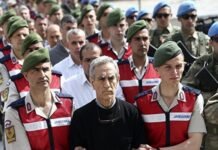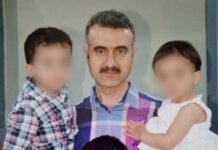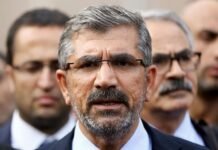Brig. Gen. Hakan Evrim, a suspect in the July 15 coup attempt trial and commander of Akıncı Airbase, where Chief of General Staff Gen. Hulusi Akar was taken hostage, said on Monday that the coup attempt seems to have been planned to fail by someone operating outside of Turkish Armed Force (TSK) methods, DHA reported.
“On July 15 at 14-15:00 p.m., [National Intelligence Organization] MİT received information that a coup attempt would take place. The chief of general staff was informed about it at 17:00. A coup attempt that could have been prevented by sending an order to all units that no one should leave their garrison or by calling all military personnel back to their units was not prevented due to the lack of a few simple measures. Despite the fact that intelligence about the coup was received at about 14:00, President [Recep Tayyip Erdoğan] learned about it from his brother-in-law. The chief of general staff, according to the indictment, learned it from [Gen.] Mehmet Dişli, and other commanders learned it from the military members who detained them. How does that work?” Evrim said during his defense at the Ankara 17th High Criminal Court in Sincan where 221 suspects accused of being ringleaders of the failed coup attempt on July 15 are standing trial.
In this regard, referring to the testimony of Bülent Bostanoğlu, commander of the navy, in the indictment, Evrim said: “He said that that day they arrived at a wedding ceremony at 19:30 going on at an İstanbul hotel. He said he sent his adjutant and driver home in order to avoid being detained by coup plotters as part of security measures. So he confessed that he knew about the coup attempt at 19:30 and even knew that the coup attempt which was planned for the next day at 03:00 had moved forward. That is clear evidence that the coup attempt was not prevented despite the fact that it was known about beforehand.”
Claiming that half of the commanders in the air forces were attending the wedding ceremony on the night of the coup, Evrim said: “Most of those commanders are now under arrest. If those commanders are members of FETÖ [a derogatory term used by President Erdoğan and the government for the Gülen movement], why did they attend a wedding ceremony that night? If an organization plans a coup, why did they not plan to get the commanders of the airbase ready to use aircraft?”
“According to the indictment, 10 percent of TSK personnel were used during the coup. If this was the final effort of the organization, why they did not use a large enough number of personnel? Why they did not use the police who were dismissed and arrested for being members of FETÖ?” added Evrim.
Drawing attention to the swift response of the government to the coup attempt, Evrim recalled a statement made by Prime Minister Binali Yıldırım on a TV program on the night of July 15 that “there has been a coup attempt, there are some groups using weapons of the state against citizens. They will quickly learn who those groups are and take the necessary measures.”
“Mr. Prime Minister said this at 23:02. It is also mentioned in the indictment. Before the prime minister finished speaking, the Ankara Chief Public Prosecutor’s Office had launched an investigation into the coup plotters at lightning speed, at 23:05. They were sure no police were part of it at that hour, and they launched an investigation only into military personnel.
“At midnight trucks belonging to the state and municipality loaded with sand were parked in front of the headquarters of the Etimesgut Armored Unit under orders that tanks could not leave the garrison. The next day, the [Supreme Board of Judges and Prosecutors] HSYK had an emergency meeting to evaluate the situation of pro-FETÖ judges and prosecutors. Detention lists were issued in the morning. SMS messages were sent to military personnel to return to their units. A travel ban was imposed. I am leaving it to your judgment as to how was it possible to do this without any preparations made in advance,” added Evrim.
Regarding the jet attacks on Parliament and police headquarters, Evrim said those attacks could not have been part of a coup attempt that was meant to succeed.
“It’s not possible to understand why Parliament was bombed. In order to destroy that building you would need to have 35 or 40 F-16s. Moreover, the Parliament building was bombed during the hours when the coup attempt was seen as already having failed. Hence, when number of F-16s used during the coup attempt, the targets and times of the bombings are taken into consideration, it can be understood that the F-16s were used not for the coup but rather to shape public perception.”
Recalling the situation of Adil Öksüz, the prime civilian suspect in the coup attempt, Brig. Gen. Evrim asked why an investigation into the people who were responsible for the release of Öksüz despite the fact that he had been detained on the night of the coup were only launched seven months later the incident.
Evrim also said in order to prevent the coup, Chief of General Staff Gen. Akar proposed alternative solutions to the military personnel at Akıncı Airbase.
Denying claims by Akar that Evrim offered to put him in touch with Turkish Islamic scholar Fethullah Gülen by phone on the night of the coup, Evrim said:
“Hulusi Akar, Akın Öztürk, Kubilay Selçuk and Mehmet Dişli were in the room. Akar said he agreed with the accusations and that the country should be get out of its difficulties. He said meeting with [former President] Abdullah Gül, [former Prime Minister] Ahmet Davutoğlu and other party members would be useful. I said if you want, I can help you have phone conversations with the leaders of civil society, and opposition party members as well. I was not there to persuade Akar. I was taken there by force.”
Evrim also said if it had been a real coup attempt, the security cameras at the airbase would have been shut down in advance.
“This was not a coup attempt that originated with the TSK. It was carried out by people who knew nothing about planning. July 15 was planned to fail.”
CHP SAYS PARLIAMENTARY COMMISSION REPORT HIDES FAILED COUP’S POLITICAL ASPECTS
Meanwhile, Turkey’s main opposition Republican People’s Party Deputy Chairman Aykut Erdoğdu said on Monday that a recent parliamentary commission draft report released by its chairman from the ruling Justice and Development Party (AKP) aims to denigrate innocent people and avoids investigations into people from AKP circles who were involved in a failed coup last summer.
At a press conference in Ankara on Monday, Erdoğdu said the draft report released by AKP deputy Reşat Petek on Friday hides details about the AKP’s responsibilities in the failed coup and portrays it as a natural disaster that cannot be prevented.
“Did the chief of general staff and MİT (National Intelligence Organization) undersecretary hide prior information about the coup from the president and prime minister? If they did, why are they still on the job? Was the coup attempt known by the government beforehand? Were those citizens who died on the night of the coup massacred in a staged coup? Why were necessary precautions not taken despite the fact that MİT knew about the coup at noon on July 15? Who are those in the political part of the coup? Who would have been president if the coup had been successful?” Erdoğdu asked during the press conference.
The chairman of Turkey’s parliamentary Coup Investigation Commission on Friday unveiled a draft report prepared by the commission about the failed coup attempt on July 15 that fell short of casting any light on the putsch and repeated the narrative of the AKP government.
The 630-page-long report was prepared in four months, 15 days. The Coup Investigation Commission has attracted widespread criticism for not hearing key figures such as Chief of General Staff Gen. Hulusi Akar and MİT Undersecretary Hakan Fidan.
The report accuses the faith-based Gülen movement of masterminding the July 15 coup attempt, a claim made by Turkey’s autocratic President Recep Tayyip Erdoğan while the coup attempt was still unfolding. However, the report bases its this accusation on the testimonies of some coup suspects such as Col. Levent Türkkan, who held Gülen followers responsible for the coup attempt in his first testimony but admitted at a court hearing earlier this week that his first testimony was false because he gave it under torture.
Türkkan, aide-de-camp of Chief of General Staff Gen. Akar, is among 221 suspects accused of being ringleaders of the failed coup attempt on July 15 whose trial began at an Ankara court on Monday.
“I didn’t make a truthful statement [in that testimony]. I was totally destroyed. I was receiving IV fluids. They X-rayed my brain. I didn’t make a single truthful statement,” Türkkan said during a court hearing on Tuesday.
Petek, who spoke at a news conference to release the draft report, said the commission has so far been unable to obtain any answers from Gen. Akar related to the coup attempt. Akar was taken hostage by the coup plotters on the night of July 15 and was released on July 16 when the coup attempt was suppressed.
The commission’s report admits that there was an intelligence failure that prevented authorities from taking measures to prevent the coup attempt, which claimed the lives of more than 240 people and injured a thousand others, from being staged.
Despite the apparent failure of the Turkish intelligence authorities to gather intelligence about the coup plans, no intelligence official has resigned or been fired by the government.
AKP DEPUTY CALLS FOR SEARCH OF US CONSULATE GENERAL TO FIND PRIME COUP SUSPECT
On the other hand, the ruling AKP’s deputy Şamil Tayyar said in order to find Adil Öksüz, one of the prime suspects in a failed coup attempt in Turkey on July 15, the US Consulate General in İstanbul should be searched, claiming that the coup attempt was a NATO operation.
“His [Öksüz’s] contact with the US Consulate General in İstanbul [a phone call] was mentioned. There are some doubts. It would be better if the US Consulate were searched in order to get rid of doubts. They may not open their gates to police or intelligence officials, but a delegation approved by them could search the consulate building,” Tayyar said in an interview published by the pro-government Akşam daily on Monday.
Öksüz was reported to have been caught while trying to escape from Akıncı Air Base in Ankara on the morning of July 16, 2016, but he was released a short while later by a court in Sincan. He has been at large since then.
In March, it was reported that the US Consulate General in İstanbul called Öksüz six days after the failed coup attempt.
The US Embassy in Ankara said in a statement at the time that the US Consulate General in İstanbul called Öksüz on July 21, 2016 after Turkish police contacted the US mission in Turkey the same day for help in preventing him from leaving the country.
“We then revoked his US visa and, as required by US law, tried to call him to inform him of the cancellation. Far from being suspicious, the call from the Consulate General illustrates the close US-Turkish law enforcement cooperation following the coup attempt,” the US Embassy statement read.
Tayyar listed three possibilities about the whereabouts of Öksüz: “He could have been killed. He could have fled abroad. He could have been hiding in a safe place in Turkey. He could have been hiding in a consulate.”
According to the AKP deputy, the failed coup attempt was an operation by NATO.
“July 15 was a NATO operation. NATO has mainly used FETÖ [a derogatory terms used for Gülen movement by government] members, but there are secularists and NATO supporters among them [putschists] as well. Their common enemy is [President Recep Tayyip] Erdoğan,” added Tayyar.
Underlining that followers of the Gülen movement have been dismissed from state institutions on a large scale, Tayyar also called for the purge of secularists and NATO supporters from the state:
“Let’s call them Kemalists. They are also a risk for our democracy. I do not say for all, but I think that some of them are controlled by NATO. (…) That is the reason why the states should not only be cleansed of FETÖ members but also of NATO supporters. The risk of a coup will be there as long as we do not cleanse them from the state,” he claimed.
Immediately after the putsch, the AKP government along with President Erdoğan pinned the blame on the Gülen movement.
Fethullah Gülen, who inspired the movement, strongly denied having any role in the failed coup and called for an international investigation into it, but President Erdoğan — calling the coup attempt “a gift from God” — and the government initiated a widespread purge aimed at cleansing sympathizers of the movement from within state institutions, dehumanizing its popular figures and putting them in custody.
As part of a witch-hunt targeting people linked to the Gülen movement, 154,694 individuals have been detained and 50,136 have been jailed since July 15 in Turkey, the state-run Anadolu news agency reported on May 28.
Contrary to accusations made by President Erdoğan and the Turkish government, the Foreign Affairs Committee of the UK Parliament concluded in March that Gülen and the movement he inspired as a whole were not behind the failed coup in Turkey.
The UK Parliament statement came a week after Germany rejected Erdoğan and the Turkish government’s accusations against the Gülen movement about July 15.
The head of Germany’s Federal Intelligence Service (BND), Bruno Kahl, said Turkey could not convince them that US-based Turkish-Islamic scholar Gülen was behind the failed coup in July.
Similarly, Devin Nunes, chairman of United States House Permanent Select Committee on Intelligence, said he has not seen any evidence showing Gülen’s involvement in the putsch in Turkey.
In addition, a report prepared by the EU Intelligence Analysis Centre (IntCen) revealed that the coup attempt was staged by a range of Erdoğan’s opponents due to fears of an impending purge. (SCF with turkishminute.com) May 29, 2017
















